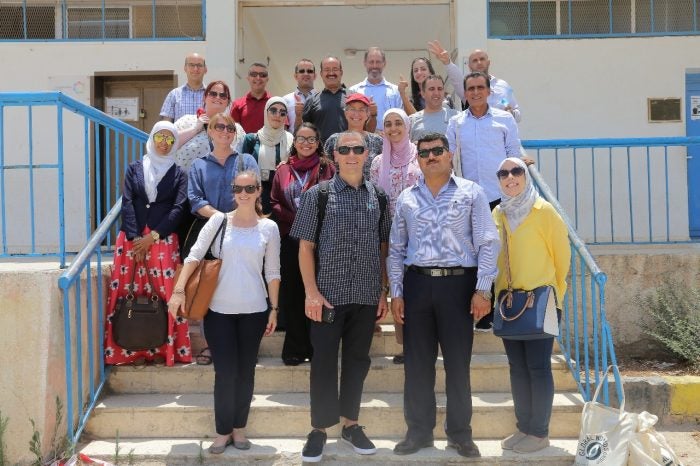Global Nomads Group is supported by the Stevens Initiative, a public-private partnership including the U.S. Department of State and the Bezos Family Foundation. It gives young people the opportunity to broaden their minds and exposes them to a world they did not know existed.
For some educators, this was the first time they traveled outside of their home countries. They met colleagues they had been working with for an entire year, conducting weekly sessions pairing their classrooms and their students with others abroad. The trip offered them opportunities to interact with other teachers, discuss pedagogies and new ideas, and learn about each other’s perspectives and cultures.
“Participating in this program helped me see the world differently. It helped me not only understand, but grasp that the world is ever-changing. Our students are going to go out in the world, get jobs, and meet people they would never have imagined meeting before. Having my students participate in this virtual exchange is so valuable, as they never imagined getting out of Kentucky; they can now feel there is a great and exciting world around them,” Jill Armstrong, a high school teacher from Kentucky, told me on her visit to Jordan. “It also highlighted that although there are many cultural differences, there are also many similarities. Our students have learnt how to celebrate diversity, rather than shy away from it.”
During the week in Jordan, educators discussed the importance of virtual exchange as an educational tool. “It starts with self-reflection, encouraging students to reflect internally; [understanding] themselves more and understanding the communities around them,” said Ihab Salameh, GNG’s head of the Middle East and North Africa office. “They are then ready to collaborate and engage with students across the globe. These students would not normally have the chance to travel or participate in exchange programs.”
This was further emphasized by Huda Hajaya, a public school teacher in Qatrana in the south of Jordan. “I felt my students started accepting each other more. This is very important, as it encourages social cohesion and collaboration.”
For teachers, the benefits of the program extend beyond the classroom. Fadia Abu Zaida, a teacher at a public school in Safout, central Jordan, said that this program gave her the “courage to have a voice. It enhanced my self-confidence, not only in school but with my family as well,” she said.
Beyond its lasting effects on students and teachers, Campfire has benefited students’ parents. “They previously had misconceptions on the use or misuse of technology; they thought it was a waste of time. But we were successful in showing them how students are using technology for useful skills, understanding, communicating and exposure to new knowledge. They were convinced when they saw it in action and when they witnessed their children’s personality positively change,” said Fahmi Madani, Secretary General of the Moroccan Association of Teachers in English, GNG’s partner in Morocco.
The delegation to Jordan included site visits to various educational institutions, such as the Queen Rania Teacher Academy, Madrasati Summer Camp, and the Shams Community Center. The schedule was full of interactive activities that added value to the teachers’ experiences; including a regional briefing from guest speakers who provided context about the education climate in Jordan and highlighted key educational challenges that public schools faced. Professional development and program development sessions focused on human centered design, virtual reality demonstration, self-reflection, and goal setting. Delegates had the opportunity to share more about their educational settings and discuss pedagogies utilized in the region. The visits were paired with visits to Jordanian cultural sites like Jerash and Petra.
The trip provided the educators with opportunities to brainstorm, explore solutions and commit to next steps of continuing virtual exchange in their respective schools. “We are looking forward to the educators transferring what they have learnt this week and applying it in their classrooms,” said Salameh.

